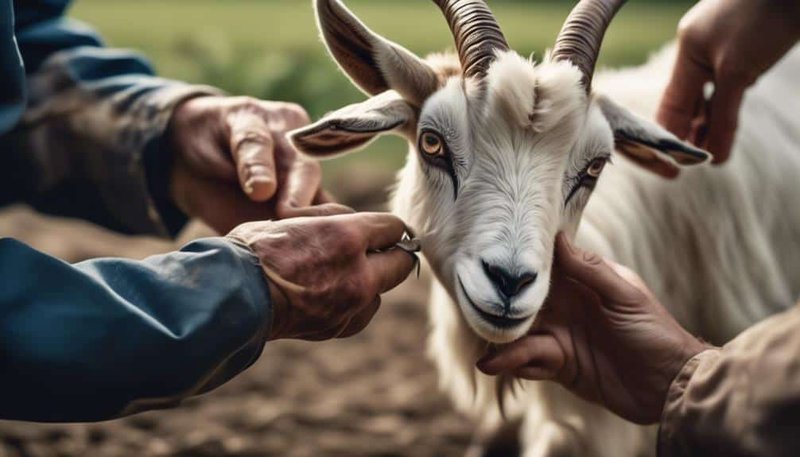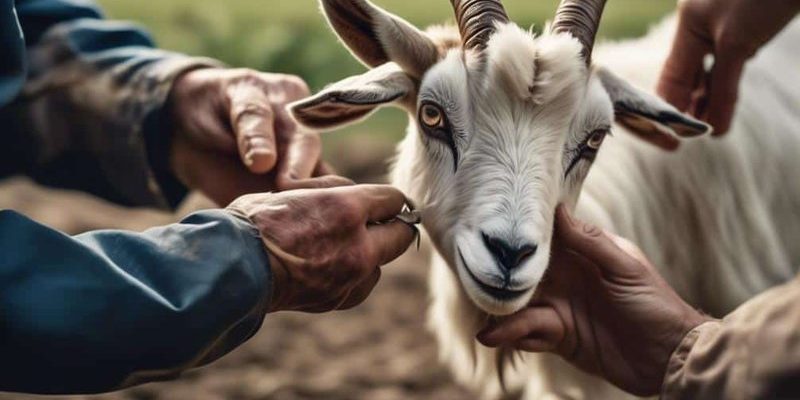
So, let’s dive into the common health issues Alpine goats might encounter and how you can prevent them. Knowing what to keep an eye out for can make a world of difference for these beautiful creatures. Whether you’re a first-time goat owner or just brushing up on your goat care knowledge, I’ve got you covered.
1. Digestive Disorders
Alpine goats are known for their healthy appetites, but that also means they can easily get into trouble with their digestion. One of the most common issues is bloat, which occurs when their stomach fills with gas. This can be quite serious, potentially leading to death if not addressed swiftly. If you’ve ever tried to eat too much pizza in one sitting, you might understand that uncomfortable feeling—they feel it too, but for goats, it can be much worse.
Prevention Tips for Digestive Health:
– Monitor Feeding: Introduce new feeds gradually. Goats are very sensitive to changes in their diet. If you’re switching to a new grain or hay, mix it with their old feed over several days.
– Provide Enough Roughage: Make sure they have access to high-quality hay for roughage. This helps keep their digestive system moving and reduces the chances of bloat.
– Regular Deworming: Parasites can lead to digestive issues. Schedule regular deworming treatments based on your veterinarian’s advice.
Keeping an eye on what your goats are munching on and how they react to new foods can save a lot of trouble down the line.
2. Hoof Problems
Hoof health is something that can easily be overlooked, but trust me—it’s as crucial as regular check-ups for us humans. Alpine goats are very active, and their hooves take a beating. Foot rot, a bacterial infection, is a widespread issue that usually arises in wet, muddy conditions. It can be painful for the goats, affecting their ability to walk comfortably.
Tips for Healthy Hooves:
– Regular Trimming: Keep their hooves trimmed every 4–6 weeks. Overgrown hooves can lead to a host of health issues, including foot rot.
– Clean Living Conditions: Ensure their living area is dry and clean. If your goats are standing in muddy conditions, they’re more prone to hoof problems.
– Check for Signs of Infection: Regularly examine their hooves for signs of cracking or sores. Catching these issues early can make a significant difference.
By paying attention to hoof care, you’re not just preventing pain; you’re also ensuring that your goats stay active and healthy.
3. Respiratory Issues
Just like us, goats can get sick with colds and respiratory infections. Pneumonia is a particular concern, especially in young or stressed animals. If you’ve ever had a lingering cough, you know how exhausting it can be. For goats, it can be life-threatening if not treated in time.
How to Prevent Respiratory Problems:
– Ventilation is Key: Make sure their barn or shelter is well-ventilated. Stale air can lead to illness and respiratory infections.
– Avoid Overcrowding: Too many goats in one space can cause stress and increase the risk of spreading diseases. It’s like having too many people in a stuffy room—no one feels good in that situation!
– Vaccination: Consult your vet about vaccinations that can protect your goats against respiratory diseases.
Keeping their living conditions clean and stress-free can significantly reduce the risk of respiratory issues.
4. Mastitis in Dairy Goats
If you’re raising Alpine goats for milk, you’re likely worried about mastitis, an infection of the mammary glands. This condition can reduce milk production and make the goat uncomfortable or even painful. Imagine trying to work while you’re dealing with a nasty cold—you’d be miserable, right? That’s what mastitis feels like for goats.
Prevention Strategies:
– Milking Hygiene: Always practice good hygiene when milking. Clean the udder and your hands before and after milking to prevent bacteria from entering.
– Regular Checkups: Keep a close eye on their udder. Any swelling, redness, or unusual discharge should be examined by a vet.
– Balanced Diet: Make sure your goats receive a balanced diet rich in calcium and phosphorus. This keeps their immune system strong and helps prevent infections.
Maintaining good milking practices and a balanced diet can help keep your dairy goats healthy and happy.
5. Skin and Coat Issues
Your Alpine goats’ skin and coat say a lot about their general health. Issues like scabies or ringworm can affect their well-being and appearance. If you see your goat scratching or losing hair, it’s time to take action. It’s like how we would feel if we had itchy skin—it’s annoying and can lead to further complications.
Tips for Healthy Skin and Coat:
– Regular Grooming: Brush your goats to remove dirt, debris, and loose hair. This promotes healthy skin and strengthens your bond with them.
– Keep Their Environment Clean: Ensure their living area is clean and dry. This helps prevent skin infections or parasites.
– Consult a Vet: If you notice any unusual skin conditions, consult your veterinarian. Early treatment can prevent more severe issues down the line.
Healthy skin and a shiny coat aren’t just for looks; they are indicators of overall goat health.
6. Vaccination and General Health Care
Preventive health care is crucial for any livestock, and Alpine goats are no exception. Regular vaccinations can protect them from common diseases that can lead to significant health problems. Think of it like getting a flu shot to avoid getting sick—it’s better than dealing with the aftermath!
Vaccination Schedule:
– Core Vaccinations: Work with your veterinarian to establish a vaccination schedule tailored to your herd’s needs. Common vaccines include those for tetanus and overeating disease (enterotoxemia).
– Annual Check-ups: Schedule annual health checks to ensure your goats remain healthy. Early detection of issues can save lives.
– Monitor Health: Keep track of their overall health and behaviors. Any changes in eating, drinking, or activity levels can signal underlying issues.
By prioritizing vaccinations and regular check-ups, you’re taking responsible steps to ensure your goats live long, healthy lives.
7. Conclusion
Owning Alpine goats can be incredibly rewarding, but it comes with the responsibility of keeping them healthy. Understanding common health issues and how to prevent them can make all the difference in your goat-raising journey. From managing digestion to caring for their hooves and skin, being proactive is key.
Remember, the better you care for your goats, the more you’ll enjoy their companionship and the benefits they offer. With some attention and preventive care, your Alpine goats can thrive, keeping you both happy and healthy for years to come. So, grab that brush, stock up on proper feed, and enjoy your time with these wonderful animals!

